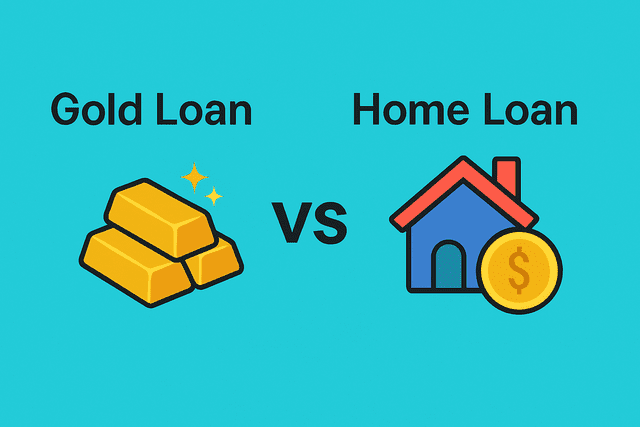
Gold Loan vs Home Loan: What’s the Smart Choice for You
When it comes to securing a loan, two popular options that come to mind are gold loans and home loans. Both offer financial support but differ in purpose, features, and suitability. This article compares the two, helping you decide which option better fits your financial goals.
Table of Content
Key Differences Between Gold Loan vs Home Loan
Understanding the differences between a gold loan and home loan helps to choose the one that aligns with your financial needs.
Loan Amount
- Gold Loan: The loan amount is determined by the value of the gold pledged. Typically, you can get a loan of up to 75% of the gold’s value. The loan amount is generally smaller when compared to home loans, ranging from a few thousand to a few lakhs.
- Home Loan: Home loans offer much larger amounts, typically starting from ₹1 Lakh to several crores, depending on the property’s value. The loan is usually tied to the cost of the property you intend to buy or build.
Loan Tenure
- Gold Loan: Gold loans are short-term loans with tenures ranging from a few months to a few years. This makes them ideal for borrowers who need quick access to funds for a limited period.
- Home Loan: Home loans have longer repayment tenures, typically ranging from 10 years to 30 years. This allows borrowers to repay the loan in smaller, more manageable instalments over a long period.
Interest Rates
- Gold Loan: Gold loan interest rates typically range from 8% to 29%a., with higher rates possible due to the short-term nature and varying lender policies.
- Home Loan: Home loan rates usually range between 8% and 13%a., often lower on average due to the long tenure and lower risk for the lender.
Eligibility Criteria
- Gold Loan: Gold loans have minimal eligibility criteria. If you can pledge gold, lenders usually don’t require income proof or a strong credit score. This makes them suitable for individuals with limited credit history or lower scores.
- Home Loan: Home loans have stricter eligibility criteria. Lenders usually check your credit score, income, employment status, and the property’s value before approving the loan. The process involves more paperwork and verification compared to a gold loan.
Approval and Processing Time
- Gold Loan: Gold loans are typically approved in just a few hours or within a day. The disbursal process is also quicker, especially if you apply online or visit a branch directly.
- Home Loan: Home loan approval might take several days or even weeks due to the documentation and verification involved. Additionally, the disbursal process for home loans can take longer, as the property needs to be evaluated and registered.
Purpose of the Loan
- Gold Loan: Gold loans can be used for a variety of purposes such as medical emergencies, business needs, education, or personal expenses.
- Home Loan: Home loans are designed for property-related expenses. These loans are generally not available for other purposes unless it’s related to purchasing, constructing, or renovating a property.
Advantages and Disadvantages of Gold Loans
Advantages
- Quick Approval: Quicker approval process makes gold loans ideal for urgent financial needs.
- Less Documentation: Only basic identity and address proof are required, along with the gold to pledge.
- Flexible Repayment Options: Many lenders offer EMI options, bullet payments, or overdraft facilities.
- No Credit Score Requirement: Since the loan is secured by gold, a poor credit score won’t prevent you from getting approved.
Disadvantages
- Higher Interest Rates: Compared to home loans, gold loans generally come with higher interest rates.
- Risk of Losing Gold: If you fail to repay the loan, the lender has the right to sell the pledged gold to recover the loan amount.
- Shorter Loan Tenure: The shorter repayment tenure may not be suitable for larger amounts.
Advantages and Disadvantages of Home Loans
Advantages
- Lower Interest Rates: Home loans typically have lower interest rates compared to gold loans.
- Higher Loan Amounts: You can borrow larger amounts, which is ideal for purchasing a property.
- Longer Tenure: The long repayment period makes it easier to manage monthly repayments.
- Tax Benefits: Home loan borrowers can avail of tax benefits under Sections 80C and 24(b) of the Income Tax Act, 1961.
Disadvantages
- Lengthy Process: The approval and disbursal process for home loans is lengthy, requiring detailed documentation and verification.
- Eligibility Criteria: Home loans have strict eligibility criteria, including a good credit score and proof of income.
- Risk of Losing Property: If you miss repayments, the lender may seize and auction the property to recover the loan.


